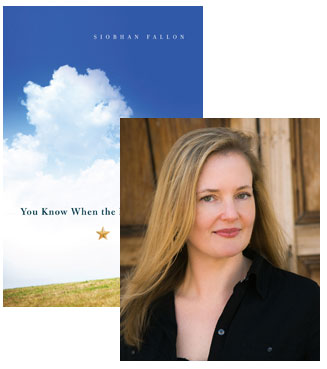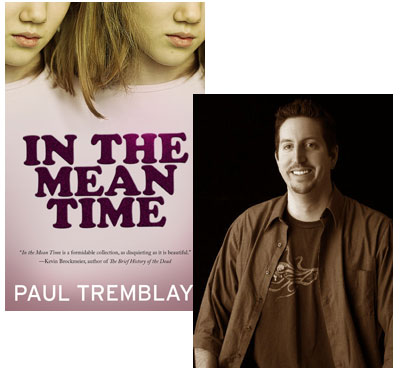Siobhan Fallon Picks Up “The Things They Carried”

Siobhan Fallon knows about the cost of the conflicts in Iraq and Afghanistan on the families of American soldiers—she lived at Fort Hood, Texas, while her husband served two tours of duty. The stories in You Know When the Men Are Gone show us how the prolonged separation stresses the emotional seams of marriages and families, and how what happens to one soldier can affect an entire community, as peripheral characters in one story are brought into closer focus later on. Stories like “Camp Liberty” and “The Last Stand” also address what happens to the soldiers themselves, the ways combat duty reshapes their own relationships with their domestic lives. In writing this collection, and fitting its stories together just so, Fallon drew some of her inspiration from one of the greatest chroniclers of the 20th-century American military experience, as she explains in this essay.
When I was getting my MFA at the New School in New York City, I came across Tim O’Brien’s short story, “The Things They Carried.” This was 1999, before I met my army officer husband, before I, or my classmates for that matter, had any inkling that war could touch us in the middle of New York City. As soon as I read the opening line (“First Lieutenant Jimmy Cross carried letters from a girl name Martha”), I knew that this would not just be the story of a battle or firefight or even Vietnam, but something that encapsulated hope, a longing for home, and everything in-between. And I was right. “The Things They Carried” packed the same devastating punch when I was a civilian, certain of my safety in the world, as it does now that I am an army spouse with a husband who has served three year-long deployments to the Middle East.
Tim O’Brien never holds back. The reader is told the climax in the second paragraph: Ted Lavender will die. This is mentioned over and over again and yet it is no less shocking when it actually unfolds in a scene. O’Brien deftly uses repetition, turning the characters and their possessions over and over again in his hand, holding them out for the reader’s inspection, until the lines almost become a chant, creating a rhythm to accompany the soldiers’ endless walking, a literary cadence. Each retelling reveals a little bit more of the story, revisiting each angle and seemingly mundane detail that will loom extraordinary when Ted Lavender is shot in the head.
20 January 2011 | selling shorts |
Paul Tremblay: “Man The Flying Saucers”

You’re going to want to read every short story in Paul Tremblay‘s collection, In the Mean Time, but here’s the thing: You can’t read them all at once. Heck, you can’t read more than one or two stories like “The Teacher,” or the really unsettling ones like “The Blog at the End of the World” and “It’s Against the Law to Feed the Ducks,” without your subconscious kicking back at you later that evening while you sleep. (Try “The Two-Headed Girl” on for size; it’s disturbing, but not quite as disturbing as some of the others—it even has its darkly funny bits.) I first met Paul when he read at the Center for Fiction in 2009, and I knew he had some awesomely weird stories in him, but I didn’t know then that they were anything like these. And it seems like we readers might not be able to appreciate his voice were it not for one story in one college class, as he explains here…
I hope this doesn’t sound trite, or like some sort of put on, but I’m not overstating when I say that Joyce Carol Oates’s “Where Are You Going, Where Have You Been?†changed my life.
I was 21 years old, a second semester senior, and taking my first college lit class. My excuse is that I was a mathematics major. Well, a double major: math and humanities (long and mostly boring story as to how that happened), but yeah, my humanities consisted of a hodge-podge of philosophy, history, and music courses, plus the one lit class. Of course, some of my best friends were English majors (including my future wife, Lisa), but the proud math undergrad that I was obnoxiously proclaimed that English majors/professors/hangers on just made it all up. The truth was I wasn’t confident in my own critical reading ability and I certainly wasn’t a reader of my own free will.
Oddly enough, math guy was totally mesmerized by Professor McLaughlin. It didn’t hurt that he was cool enough to be a fan of the Dead Boys, Mission of Burma, and Husker Du. He knew how to help connect me to the text through music. And, of course, he had us read “Where Are You Going, Where Have You Been?†It’s the story that made me fall in love with reading, and shortly thereafter, writing.
I’ll never forget my first, simple, visceral reaction to the story: I didn’t know there were stories/books out there like this.
30 December 2010 | selling shorts |

 Our Endless and Proper Work is my new book with Belt Publishing about starting (and sticking to) a productive writing practice.
Our Endless and Proper Work is my new book with Belt Publishing about starting (and sticking to) a productive writing practice. 
